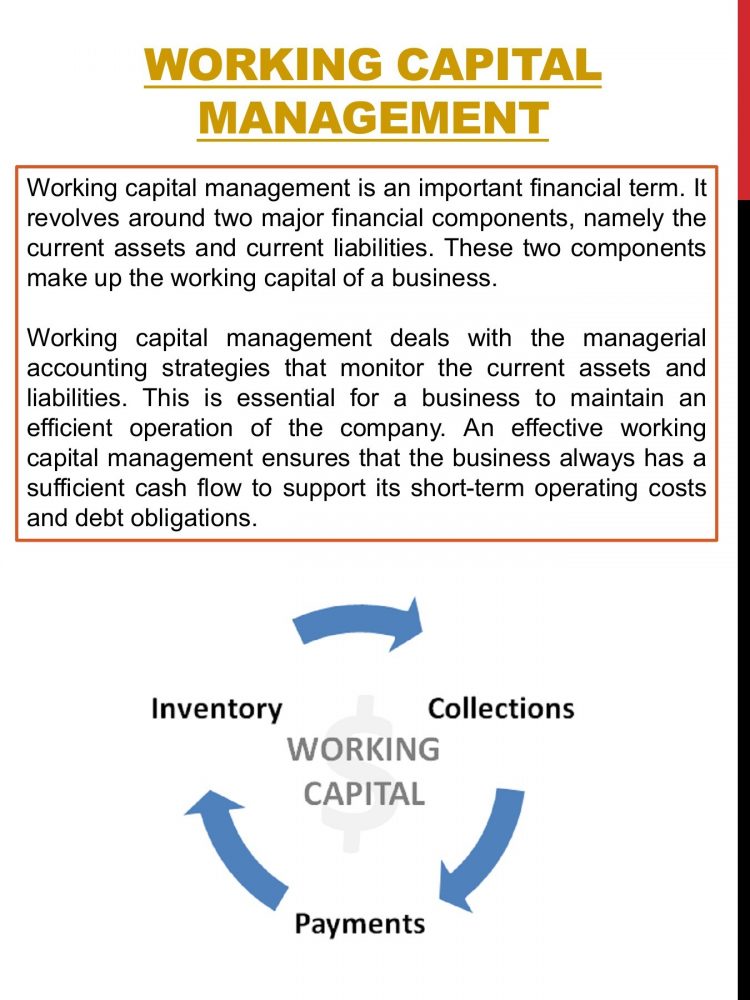Working Capital Management
 The most important aspect of working capital management is the measure of a company's liquidity position. In terms of quantifying, analysts use some ratios which can be used to compare a company's liquidity measures with those of peer companies and to compare with its historical performance. By definition, liquidity ratios are to determine the firm’s ability to pay its short-term liabilities.
The most important aspect of working capital management is the measure of a company's liquidity position. In terms of quantifying, analysts use some ratios which can be used to compare a company's liquidity measures with those of peer companies and to compare with its historical performance. By definition, liquidity ratios are to determine the firm’s ability to pay its short-term liabilities.
The current ratio is the well-known measure of liquidity:
- current ratio = current assets current liabilities
The higher the current ratio, the greater the likelihood of the company being able to pay its short-term bills. A current ratio of less than one means the company's working capital is negative and is likely facing a liquidity crisis.
- quick ratio = cash+marketable securities+receivables current liabilities
The quick ratio is a stricter measure of liquidity because it does not include inventories and other assets that may not be very liquid.
The higher the quick ratio, the more likely it is that the company will be able to pay its short-term bills.
- cash ratio = cash+mkt. sec. current liabilities
The most conservative liquidity measure is the cash ratio. The higher the cash ratio, the more likely it is that the company will be able to pay its short-term bills.
By far, we only use a very short range of asset accounts. To exam further on a company’s liquidity, analyst use activity ratios. Those ratios also known as asset utilization ratios or operating efficiency ratios are to measure how efficiently the firm is managing its assets.
A measure of accounts receivable liquidity is the receivables turnover:
- Receivables turnover = annual sales average receivables
A receivables turnover figure close to the industry standard is considered desirable.
A measure of a firm’s efficiency with respect to its processing and inventory management is the inventory turnover:
- Inventory turnover = cost of goods sold average inventory
A measure of the use of trade credit by the firm is the payables turnover ratio:
- Payables turnover = purchases average trade payables
The inverse of the receivables turnover multiplied by 365 (or 360) is the number of days of receivables (also called average days’ sales outstanding), which is the average number of days it takes for the company’s customers to pay their bills:
- Days of sales outstanding = 365 receivables turnover
A collection period (and receivables turnover) close to the industry standard is considered desirable. Another important benchmark used to interpret this ratio is the credit terms of the company.
The similarity to days of inventory on hand and number of days of payables
- Days of inventory on hand = 365 inventory turnover
As is the case with accounts receivable, it is considered desirable to have an inventory processing period (and inventory turnover) close to the industry norm. A processing period that is too high may result in too much capital being tied up in the inventory and may result in the inventory being obsolete. An excessively low processing period could indicate that the company has inadequate stock on hand, which could hurt sales.
- Number of days of payables = 365 payables turnover







